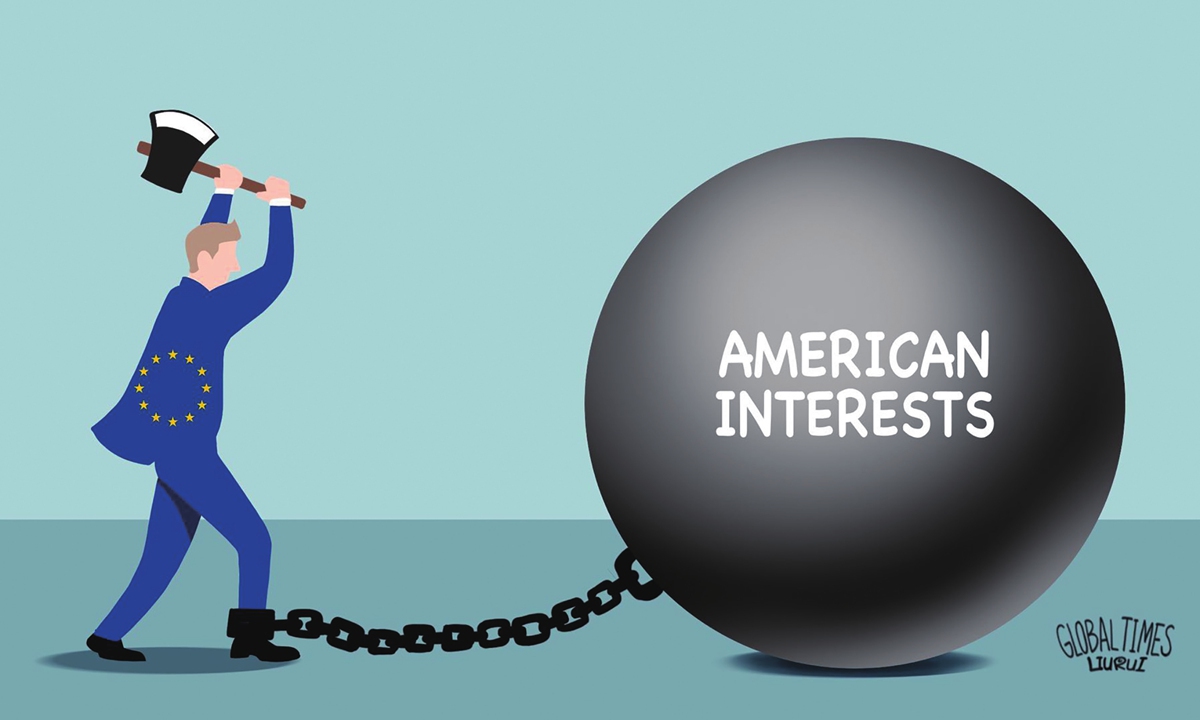
Illustration: Liu Rui/GT
The US aims to portray China's clean-energy industry as a shared threat to its European partners. However, attempting to convince Europe to back US economic pressure on China could jeopardize Europe's strategic independence. Protectionist actions by the US are not solely directed at China; if the goal is to safeguard American industry, barriers could potentially emerge along the Atlantic coast.US Treasury Secretary Janet Yellen said on Tuesday that the US and Europe needed to respond to China's industrial "overcapacity" in a "strategic and united way" to keep manufacturers viable on both sides of the Atlantic, Reuters reported.
Chinese production in areas such as electric vehicles, batteries and solar panels "significantly exceeds global demand", she said in a speech in Frankfurt.
Ahead of the upcoming meeting of G7 finance ministers, Yellen's rhetoric seems to be aimed at warning European allies about the so-called threat posed by China's clean-energy development. This is seen as the US attempting to persuade Europe to align with its larger strategy toward China. However, the US perspective distorts the facts, as global demand for clean-energy products hinges on collective efforts to drive a green transition.
China's significant contribution to the global clean-energy sector is apparent. As the world's largest producer of clean energy, China plays a crucial role in driving innovation and promoting the adoption of clean-energy technologies.
The country's rapid advancements in photovoltaics, wind energy, electric vehicles and battery technology have not only offered efficient and cost-effective solutions but have also hastened the global transition toward a low-carbon economy.
With the growing global demand for clean energy, China's expanding capacity effectively meets this demand, rather than being viewed as excessive. Furthermore, China's production capabilities have the potential to lower the costs of clean-energy technologies worldwide, making clean energy more accessible and affordable.
Against such a backdrop, it is easy to see why the US is trying to court Europe into containing China's clean-energy industry. From the perspective of the US, containing China's clean-energy industry may not be so effective and efficient without the involvement of its European allies. The US can only secure its economic and strategic interests by persuading Europe to support its aggressive tactics.
However, no matter how Washington tries to justify its actions by citing "overcapacity," it ultimately exposes its true motive of maintaining hegemony in the global industrial chain through unjustly stifling China's emerging industries.
Europe should not let Washington's stance on trade with China dictate its own trade policy. Instead, Europe should be cautious of the US' desire to maintain its economic dominance. The protectionist nature of the US determines that when it comes to its own interests, the US will not consider the interests of its allies. There are numerous examples indicating that the US only cares about its own hegemony and never bothers to think about European interests.
There are no fundamental conflicts of interest or geopolitical strategic contradictions between China and Europe. It is the US that has been pushing Europe toward becoming a strategic competitor with China. In recent years, the US has hyped so-called security risks arising from Europe working with China in areas like chip manufacturing, supply chains and infrastructure, with the view of making Europe sacrifice its economic interests to serve Washington's strategic interests.
Ironically, in the meantime, the US has only pursued its own interests at the expense of its European allies in economic policy. This was evident during the trade war initiated by the former Trump administration against Europe, and it's evident again with the Biden administration's Inflation Reduction Act.
In this context, if Europe's strategic autonomy continues to be eroded by US ideological hype, then its economic cooperation and industrial development will undoubtedly face greater difficulties, and it will increasingly have to take its cues from the US.
In this sense, it is all the more necessary for Europe to engage in constructive dialogue and cooperation with China based on its own interests and needs for its sustainable development goals.
There is competition between China and Europe, but room for cooperation in the area of clean energy far outweighs competition. Therefore, it is sincerely hoped that Europe will realize what's really in its own interests, instead of blindly following the US lead in its China policy.



